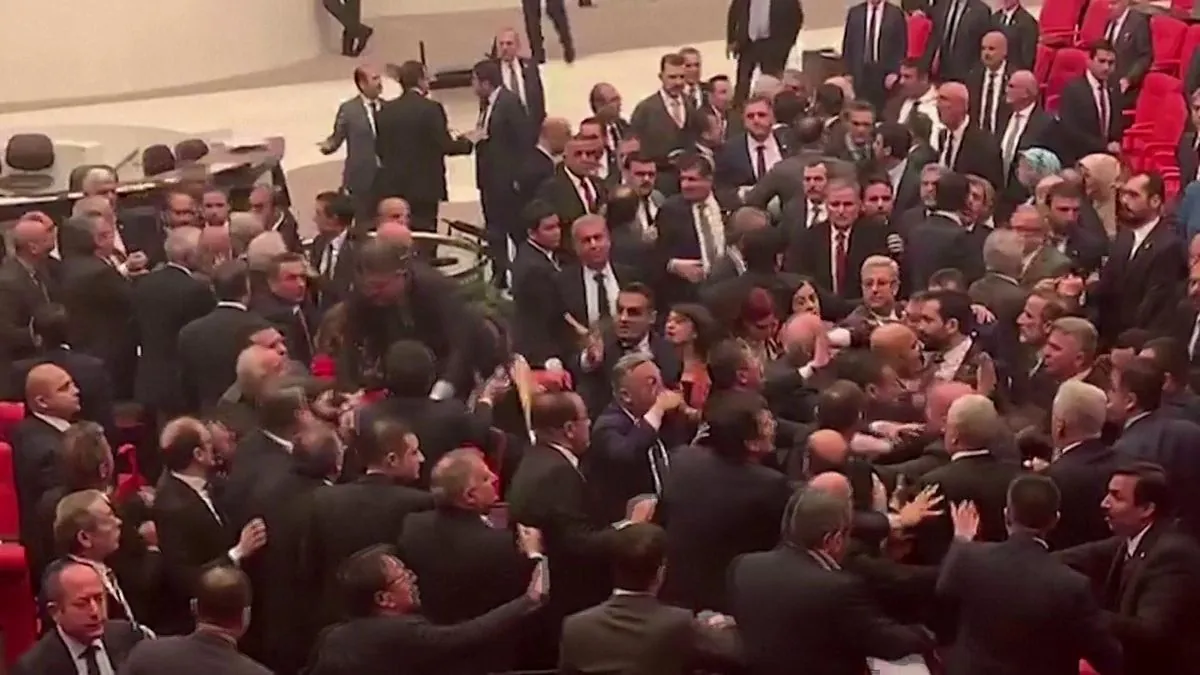Turkish Parliament Erupts in Chaos Over Jailed Opposition Member's Case
A heated debate in Turkey's parliament escalated into a physical altercation, highlighting tensions over the case of Can Atalay, an imprisoned opposition deputy. The incident underscores ongoing political and judicial challenges in the country.

In a stark display of political tensions, the Turkish Grand National Assembly witnessed a violent confrontation on Friday, August 16, 2024. The incident occurred during a debate concerning Can Atalay, an opposition member elected to parliament while imprisoned.
The altercation began when Ahmet Sik, a representative from Atalay's party, referred to members of the ruling party as a "terrorist organization" while speaking at the podium. This provocative statement led to a physical attack by a lawmaker from President Recep Tayyip Erdogan's ruling party. The ensuing brawl involved numerous deputies, resulting in injuries to at least two opposition members, including a female lawmaker who was left bleeding.

This incident highlights the deep-rooted political divisions within Turkey's 600-seat parliament, which has been dominated by Erdogan's AK Party since 2002. The Turkish Grand National Assembly, founded in 1920, has seen its share of physical confrontations, reflecting the country's often tumultuous political landscape.
The debate centered on the case of Can Atalay, who was elected to parliament in 2023 while serving an 18-year prison sentence. Atalay's conviction stems from his involvement in the 2013 Gezi Park protests, which were the largest anti-government demonstrations in Turkey's modern history. These protests challenged the rule of Erdogan, who was then Prime Minister and has held power since 2003.
Atalay's election to parliament should have granted him immunity from prosecution and secured his release from Marmara prison. However, lower courts have repeatedly ignored rulings from Turkey's Constitutional Court in Atalay's favor, creating a judicial crisis. This situation has raised concerns about the independence of Turkey's judiciary, which has faced international criticism in recent years.
"It is a shameful situation. Instead of words flying in the air, fists are flying, there is blood on the ground. They are hitting women."
The case of Atalay and the broader Gezi Park trials have drawn widespread condemnation from human rights groups and legal experts. The European Court of Human Rights, established in 1959, has twice called for the release of Osman Kavala, the main defendant in the Gezi Park case, citing arbitrary detention based on political motives.
This parliamentary chaos occurs against a backdrop of declining press freedom and economic challenges in Turkey, including significant devaluation of the Turkish lira in recent years. The country, a candidate for EU membership since 1999, continues to grapple with issues of democratic governance and judicial independence.
As Turkey approaches the centennial of its current parliamentary system, the incident serves as a stark reminder of the ongoing struggles in balancing political discourse, judicial integrity, and democratic principles in the nation's governance.


































